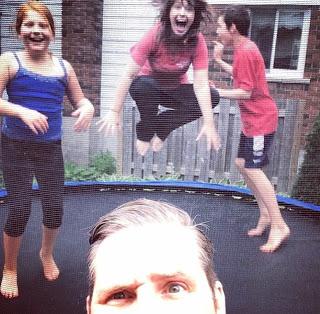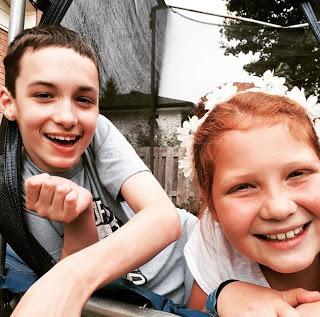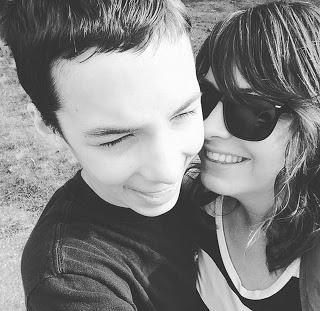I've decided to shake things up a bit, and start incorporating interviews with some parents who may not be as famous (no offense, Kate!) but who are equally - or even more - inspiring.
Today I'm profiling Peterborough, Ontario's Kate Wells, who describes herself on Twitter as "wife-mom-music lover - giggler - autism advocate - sleep chaser".
Full disclosure: Kate and I scooped ice cream together back in the 90s, but have been out of touch until we found each other on social media just a couple of years ago. I love her honest tweets about having a son with special needs (autism), and was thrilled when she agreed to share her family's experience here on This Mom Loves.
 Tell us a bit about your family.
Tell us a bit about your family.
My husband Jason and I have two amazing kids. Aidan just turned 13, and Emma is 10.5 (that half is very important!) What is the impact of having a special-needs child on a marriage, and how do you keep your relationship with your husband strong?
The impact is huge. The early years were tough! When you get married, you don't usually know how your spouse will handle challenges. Having different styles of handling severe, daily stress, can make or break even the strongest relationship. It took us several years to figure it out. But once we figured out how the other copes and respected that, we were able to come together and form a very solid team. We are totally united. It's not easy, but we know when stress is at an ultimate high,we don't take anything personally. After we have weathered the biggest of storms, we always come back stronger. We're the only ones who truly know what our journey has been like; we stick together. Date nights haven't been a regular luxury of ours for a long time, so every night,when everyone is asleep, it's our time to connect. Some nights we can't stop talking, some nights we sit in silence, side by side, melting our brains online. But we're together. And laughter has saved us many times!

What is the impact on your daughter?
Being an autism sibling is very difficult. She has made many many sacrifices - probably more than she knows. But she doesn't look at it that way. She is a nurturer. Her thoughts are always on her brother's care and best interests. Autism has never been "the elephant in the room". It's been an open dialogue since she started asking questions about her brother when she was 4 years old. We're honest with her always. We allow her get frustrated; to have feelings no matter what they are. But the connection they have is powerful and eye opening. Her experience is entirely different than ours. She has taught him so much; and in turn, he has taught her even more. Their deep connection makes my heart burst with pride.*Sniffs* But it's important for her to have her own interests, activities and space where she can be a boisterous, giggly,energetic 10-year-old old girl without the worry of triggering her brother into a meltdown. Dance and school are her places to just be Emma. What do you think the most common misconceptions are about autism?
There are so many!!! There's a very important saying that sums it all up for me: "When you've met one person with autism, you've met one person with autism". Like everyone else, no individuals are the same. We're all unique. The spectrum is huge, every individual's needs vary! Also, at one time professionals said - and many professionals still say - that autistic individuals lack empathy. In my opinion, that couldn't be further from the truth. My son feels everything in extremes, including empathy. He is very concerned about the well being of others. I could go on for days about many misconceptions, but I'll spare you the ranting! Lol!

What are the most important things you want other parents of special-needs kids to know?
Access every service that's available to you, even if you don't think it will help. It's important to cross every "t" and to dot every "i"; if not for now, for down the road to show "the powers that be" that you have legitimately tried everything possible. You never know what it'll be that works. Keep going and revisit things that didn't work previously. Also, keep those people that are in your corner close. They are your cheerleaders; they're your team and you need them! If possible, cut away any negativity. That will just distract and slow you down.
What's your most important advice for teachers?
Behaviour is a form of communication. Look for the "why" for the behaviour, then adjust and accommodate. There's no room for ego; the child's best interest always comes first. If what the teacher is doing isn't working, they must look deeper and be willing to say, "That didn't work, so let's look at why and try xyz". Ask for help, ask for advice. Communication is key.

You're very active on Twitter - how do you feel that has helped you? I started tweeting about autism locally as a way of getting some awareness out in our community after a very negative experience while out in the public with our son, and it just sort of grew from there. People wanted to know more! Then I began connecting to so many amazing autism families around the world who have become not only a great support, but also great friends.
What's the best way someone can offer support to a family which includes a child with special needs? For us, very few people have been able to help us with our son (i.e., babysitting etc), but the emotional support is a huge piece. Be understanding,don't minimize their struggles,be a good listener, help with any other child in the house. Just let them know you're there. The smallest of gestures are the biggest. A hug or a text on a difficult day can mean the world.
How would you complete the sentence "This Mom Loves..."? This Mom Loves...Kawartha Dairy ice cream! Seriously, it's a big problem! **** Thanks so much for sharing, Kate. Be sure to follow Kate on Twitter to learn even more.


